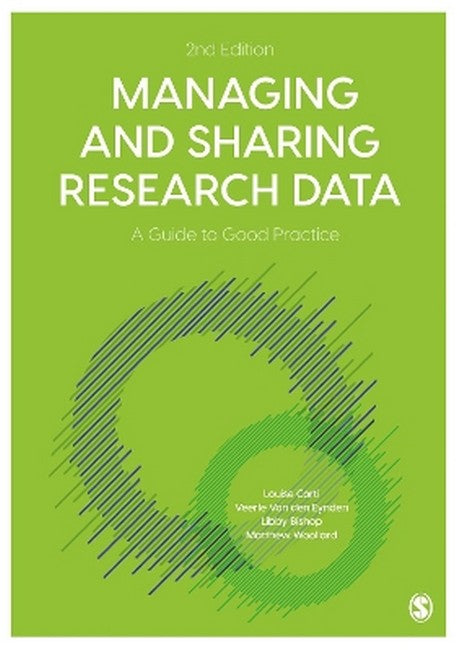Louise Corti is an Associate Director at the UK Data Archive and is Service Director of Collections Development and Data Publishing, overseeing the acquisition and ingest of high quality data of interest to social scientists. Her research activities are focused around standards and technologies for reviewing, curating and presenting digital social science data, particularly using open source infrastructures and tools. She has led research awards and regularly publishes, edits and advises internationally on a wide range of issues relating to the archiving, sharing and reuse of data. In the 90s, Louise helped establish Qualidata, the world first national qualitative data archive, pioneering approaches for and solutions to qualitative data archiving. She has taught sociology, social research methods and statistics, and spent six years working on the design, implementation and analysis of the British Household Panel Study at Essex. Veerle Van den Eynden manages the Research Data Management team for the UK Data Service. This team provides expertise, guidance and training on data management and data sharing to researchers, to promote good data practices and optimise data sharing. She combines this with a position as Research Data Manager for the Global Challenges project Drugs and (Dis)order at the School of Oriental and African Studies. Veerle has many years of experience researching interactions between people, plants and the environment, using a combination of social and natural science methods, and has experienced first-hand the benefits that data sharing brings to research. Libby Bishop is the Coordinator for International Data Infrastructures in the Data Archive at GESIS-Leibniz Institute for Social Sciences. She manages connections between GESIS and international data infrastructures, such as the Consortium of European Social Science Data Archives (CESSDA). She is leading a task in the Social Sciences and Humanities Open Science Cloud (SSHOC) project on remote access to sensitive data. She publishes on the methodological and ethical issues of sharing and reusing data. Matthew Woollard is Director of the UK Data Archive and the UK Data Service. He has practical and theoretical experience in all aspects of data service infrastructure, providing leadership in data curation, archiving and preservation activities. From 2002-2006 he was the Head of the History Data Service and from 2006-2010 an Associate Director and Head of Digital Preservation and Systems at the UK Data Archive. He currently provides leadership and strategic direction of the both the UK Data Archive and the ESRC-funded UK Data Service.
Request Academic Copy
Please copy the ISBN for submitting review copy form
Description
Chapter 1: The importance of managing and sharing research data Chapter 2: The research data life-cycle Chapter 3: Research data management planning Chapter 4: Documenting and providing context for data Chapter 5: Formatting, organizing and transforming data Chapter 6: Storing and moving data Chapter 7: Legal and ethical issues in sharing data Chapter 8: Disclosure review and anonymization Chapter 9: Rights relating to research data Chapter 10: Making use of existing research data: opportunities and limitations Chapter 11: Publishing, promoting and citing data Chapter 12: Working with big and novel data
This book is a 'must have' for anyone teaching or learning about this topic. The reader is taken on a journey of discovery and at the end will be well equipped to manage and share research data in all aspects. -- Jane Fry This book remains an essential guide for researchers and data professionals concerned with best practice data management. Accessible. Practical. Comprehensive. This edition has been revised and updated to address legal changes as well as challenges posed by new forms of data. This is a trusty companion for novices and experts alike. Highly recommended. -- Chris Gibson Written by experts in the field, this book offers a comprehensive introduction to key topics in research data management across the whole research lifecycle. Already established as an indispensable handbook, this new edition provides up to date case studies, practical guidance and extensive references. Highly recommended. -- Wayne Peters Data are a major asset of economic and social research, and the quality and provenance of research datasets fundamentally underpins the extent to which they can subsequently be shared and reused. The ESRC is the UK's largest funder of research on social and economic issues and has long been at the forefront of promoting the importance of data sharing. As the volume and complexity of datasets available to researchers continues to increase, the importance of data management in the advancement of economic and social science research becomes ever more apparent. This book approaches these topics accessibly and will offer insights to a wide audience, from those at starting to think about data management to those seeking to refresh their skills. -- Alison Park For CESSDA, as consortium of trusted repositories that offers a research infrastructure with tools and services for data producers and data re-users, good data practices throughout the data lifecycle are deemed essential to facilitate high-quality research that benefits society. This book - full of practical guidance and tips, case studies and examples, and written by longstanding and experienced CESSDA members - helps to develop the skills of researchers and data professionals to produce high quality data that are well described, curated, re-usable and as openly accessible as possible. By describing the sometimes complex facets of data management in an easy and clear way, especially with regards the ethical and legal aspects of sharing and reusing social science data, this book helps to set researchers on a path to more open science. -- Ron Dekker

